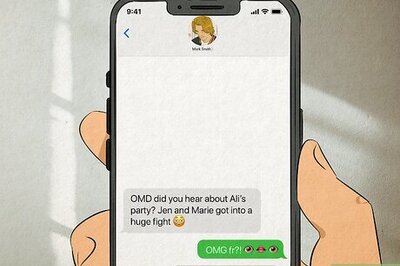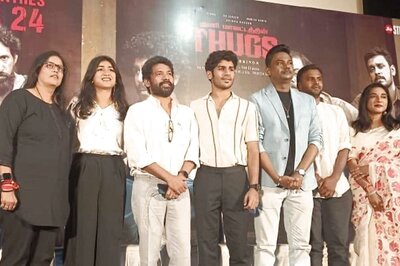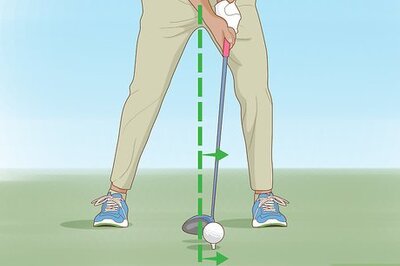
views
Baghdad (Iraq): Saddam Hussein's trial resumed on Wednesday after a delay of several hours with the deposed Iraqi leader absent from the courtroom.
Hussein's chair sat empty at the front of the dock, and his chief lawyer thanked Chief Judge Rizgar Mohammed Amin for continuing the proceedings.
Amin said Hussein would be told about the proceedings taking place in his absence and that judges would meet with the defense team after Wednesday's session to discuss the lawyers' security situation.
On Tuesday, Hussein threatened not to return to the courtroom after five witnesses testified about brutalities they experienced during a government crackdown 23 years ago.
At the end of the nine-hour court session, Hussein complained that he and his seven co-defendants were tired and had been deprived of opportunities to shower, have a change of clothes or go for a smoke.
"I will not be in a court without justice. Go to hell, all you agents of America," Hussein said.
Hussein's lawyers then conferred with the trial's judges about the situation but it was not clear whether Hussein had the option to not appear in court or whether he could be compelled to appear.
Hussein and seven other defendants are on trial in connection with the deaths of more than 140 men in Dujail, a town north of Baghdad.
PAGE_BREAK
The 1982 killings were considered retribution for a failed assassination attempt on Hussein.
Tuesday's witnesses?three men and two women sitting behind a curtain with voices disguised by a modulator?described beatings, electrocutions and deaths in 1982.
Hussein and the Baath Party were in power then and the country was at war with Iran, a crucial period in the nation's history.
Fears of retribution by Saddam loyalists forced the court to shield the witnesses' identities.
Witnesses are allowed to have their voices altered to hide their identities from the defendants, media and people in the visitors' gallery?but not from the judges or attorneys.
Breaking down in tears, a woman identified only as "Witness A" described mistreatment by Iraqi intelligence officers while at Abu Ghraib prison 20 years ago and then captivity in the desert. She said she was beaten with cables and given electric shocks.
She also described the torture of family members and other prisoners and the destruction of homes and orchards.
After her came an older woman identified as "Witness B" and a man identified as "Witness C."
PAGE_BREAK
The latter testified that he was 12 when he was rounded up in 1982. He said that he was taken first to Baath Party headquarters in Dujail, then to Baghdad, where he was tortured and sent to Abu Ghraib jail. He eventually was taken to a desert prison camp, where he spent four years before being returned to Dujail.
Asked which of the defendants he held accountable, Witness C testified that he saw defendant Barzan Ibrahim al-Tikriti, Hussein's half brother, at the Baath headquarters in Dujail.
During his cross-examination of Witness C, al-Tikriti acknowledged that he was at Baath headquarters but recalled a different encounter.
"Don't you remember? I was there. I kissed 60 men. I shook their hands, and I set them free," al-Tikriti said.
Defense attorneys questioned the accuracy of Witness C's childhood recollections.
A man testifying as "Witness D" said that he hasn't seen his son since the 16-year-old was whisked away in 1982.
The man said that after Hussein's ouster, papers were discovered indicating his son had died.
The defense pounced on this detail, questioning its authenticity.
"Witness E" also described abuse that followed the Dujail roundup.


















Comments
0 comment